This post was first published in March 2009. It has now been updated to give the definitive state of the mountain huts and shelters.
Please note the ongoing work of Acción Sierra Nevada who have created a platform to restore and rejuvenate the refugios. Spanish Highs, Sierra Nevada have been working very closely with the initiative. Last year the effort was on the Refugio de Caballo, this year the Refugio Elorrieta. It is planned for a series of continual improvement so that we can enjoy our stay in these wonderful mountain shelters.
N.B On 14th July 2012 a group of enthusiasts will be meeting at 8am at the Hoya de la Mora to ascend to the Elorrieta to do work. Get in touch with me if you wish to join us.
**Please support Acción Sierra Nevada initiative! **Read Ideal newpaper report
Refugio de Ventura
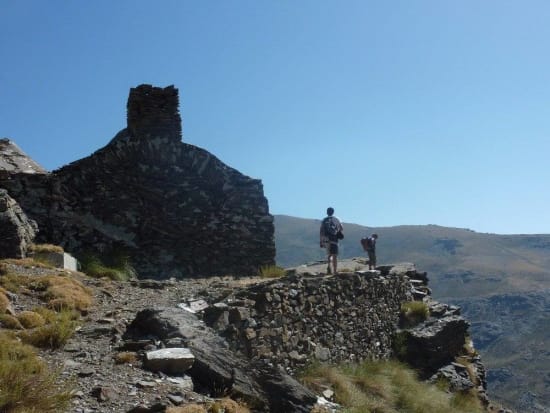
The semi ruined Ventura hut
Ruin, but good bivouac shelter. 20 mins via trailhead above Lanjaron. Hardly used as it is so close to the trailhead.
Refugio Loma de Cañar
NNE of Cerrillo Redondo S summit at a height of 2840m. A ruin, no door or window. Full report, photos and videofrom a recent visit by Pepe Badaje
Refugio de Cerrillo Redondo
Ruin. Hoya del Zorro
Is one of the forest shelters built early this century, during the work of reforestation and collection of storm waters. It is built of stone with a single nave and dome-shaped roof . The hut Is further up than the source of the Lanjarón River.
Refugio de Caballo
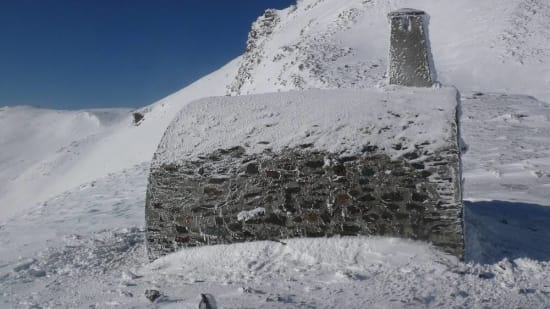
Refugio Caballo in icy conditions
Bivouac Hut sleeps 10. Next to Laguna de Caballo
Small shelter semi cylindrical, domed. It is rectangular and is constructed in masonry. It may be difficult to fit 8 or 10 people. It is located about 2860 meters above sea level, and is often used as a bivouac.
It is located at an altitude of 2.860m, next to the Laguna del Caballo, at the base of the NE face Cerro del Caballo. This is a one-room shelter. In summer 2011 the Accion Sierra Nevada initiative installed a door, painted the inside, put in a window and cleaned the refuge from top to bottom. Read more....
**This year it is hoped to make the roof watertight as winter snow melt can drip into the inside. **
It is open all year. You do not have any furniture, it is necessary to carry all the equipment for sleeping and cooking. You can find water in the Laguna del Caballo, a few meters from the refuge. The most interesting ascents can be made from this shelter are to the Cerro del Caballo itself, the ridge of Tajos Altos, and the continuation of the Integral of 3.000m.
Refugio Elorietta
Roomy bivouac shelter. SW of Tajos de la Virgen ridge
The Elorrieta Refuge is located at 3.187m above sea level, between the Tosal Cartujo and Tajos of the Virgin, in a place that winter is continuously covered with snow and swept by strong winds. It was built between the years 1931 and 1933 and christened with that name in honour of Director General de Montes D. Octavio Elorrieta.

Panorama to the north east
It was the most ambitious of a network of shelters that were designed in the 30s in the Lanjarón river valley, and the only one that was built according to plan. It had central heating, installation of water and power for lighting. Constructively it consists of two parts, a domed outside and dug into rock, with a set of galleries dug by pick and covered with a vault of bricks and tiles.
The temperature differences here between the seasons caused problems and the roof was in particularly bad shape in places. Time and vandalism have done everything else. Soon it was completely dismantled: missing doors, windows, heaters, water pipes, lighting ... even the most complete ruin. By mid-century and even in the 60s it was partially rebuilt. Three restored rooms with bunk beds, living room with fireplace, kitchen, bathroom and services.
However at present is again dismal state of conservation, but can always be useful for shelter from inclement weather. You can use the lounge, which has a table with benches, and a couple of rooms with bunk beds, but no mattresses.
The door fits well, and closes with latch. You can find water in the nearby Laguna de Lanjarón in summer (about 15 min.) Or half hour descent to Lagunillas de la Virgen.
**This year we hope to start a program of major building and restoration work. **
Refugio Cebollar
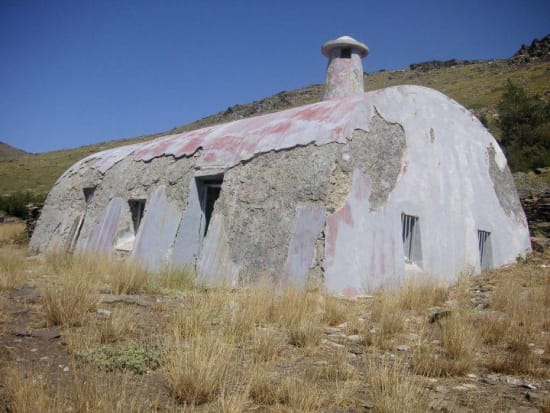
The Cebollar hut
Located at 2650m just west of the summit of Las Alegas. A beautiful location sat on a small grassy alp. Great views and close to Tajos de los Machos ski touring areas. Access, photos and report.
We are hoping to get permission to refix the two doors this summer.
Refugio Cariguela
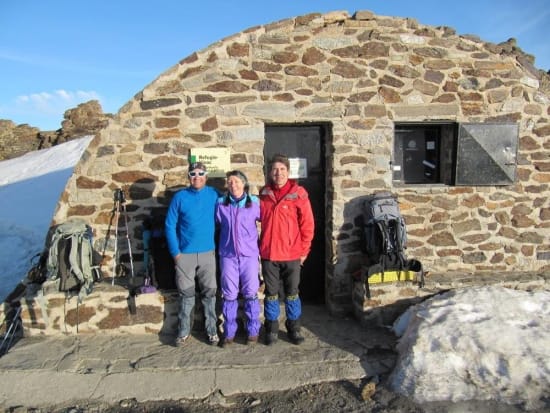
Outside the Refugio Cariguela
Good state. Hut with wooden bunks sleeps 20. Col de Cariguela S of Veleta
Refugio Vadillo
Poor shelter, partly ruined. Rio Genil, Vadillo confluence
Cucaracha
Partly ruined but adequate shelter. Cuesta del Calvario above Rio Genil
Peña Partida
Good state. Sleeps around 10 on concrete floor. Approach from the Rio Genil and Vadillo (see above)
Cueva Secreta
Overhanging rock shelter. Lower Valdeinfiernos valley, Genil
Siete Lagunas
Natural shelters, walls and outcrops. Next to Laguna Hondera Sieta Lagunas
Refugio de Caldera
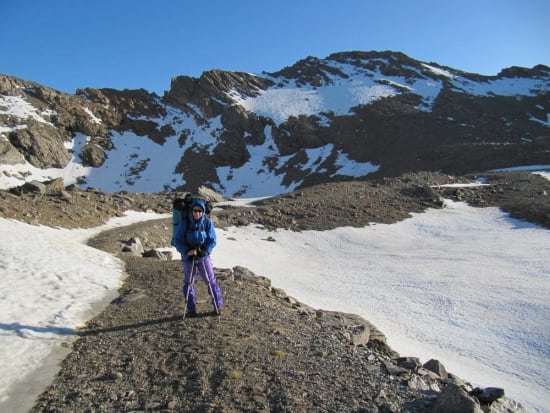
Leaving the Refugio de la Caldera
Good state. Hut with wooden bunks sleeps 20. E of Laguna de la Caldera
Postero Alto
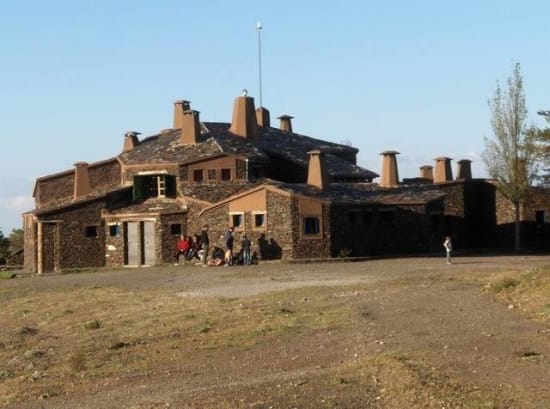
Refugio Postero Alto
Guarded Hut - winter quarters open. Firebreak main route to Picon de Jeres. Recently restored. Nice hut and good for approach to winter mountaineering at Barranco del Alhori. Read full report
Peñon Colorado
Ruin. Head of Lanjaron valley
Forest shelter built at the beginning of the century, during the 20 years, serving as support for programs in forestry and revegetation in the Sierra Nevada. It is built of coarse masonry, is a single nave and the dome-shaped roof.
It is located on the right bank of the river Lanjarón, at an altitude of 2840 meters and under the ridgeline of Tajos Altos. Has capacity for 8 people. Very near there is the "Laguna Bolands .
Refugio de Poqueira
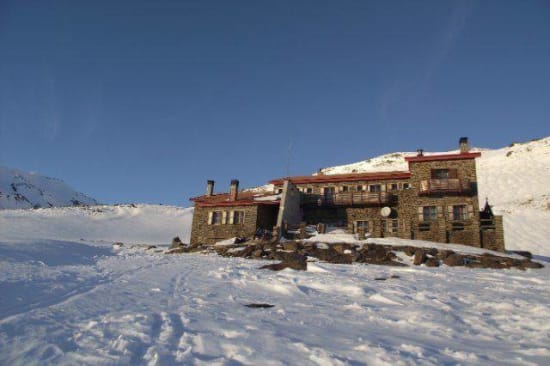
The Poqueira hut
Guarded Hut - 84 beds. Very good. Open all year. Just SE of the Rio Mulhacen at 2500m
More Information from the Federacion de Andaluza Montañismo and the Poqueira website
